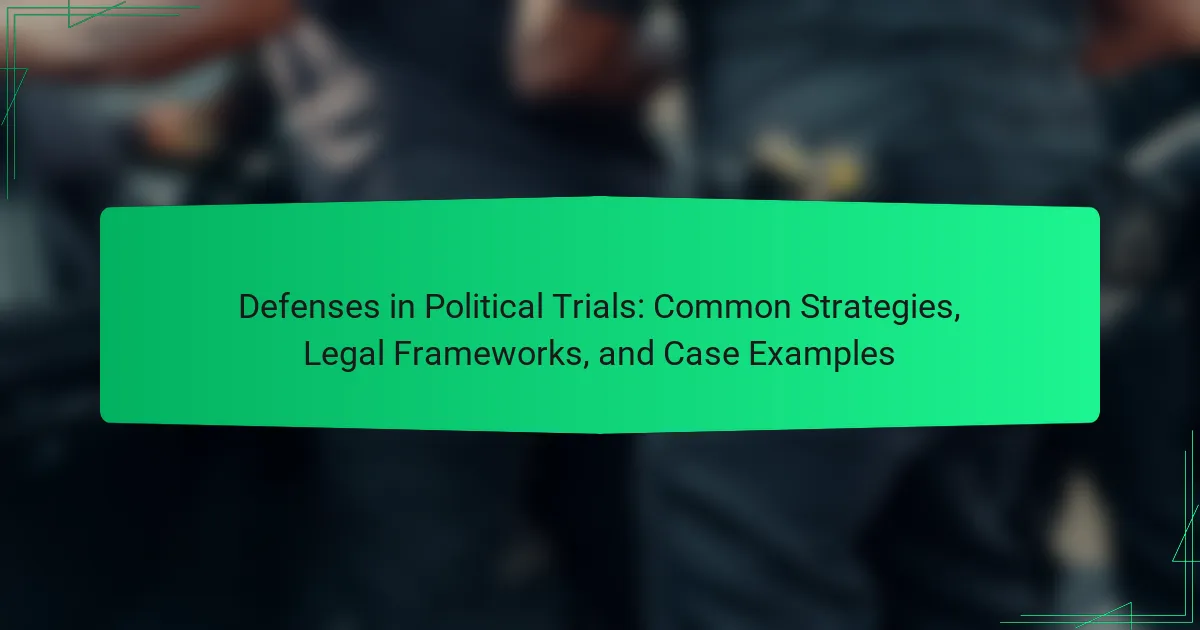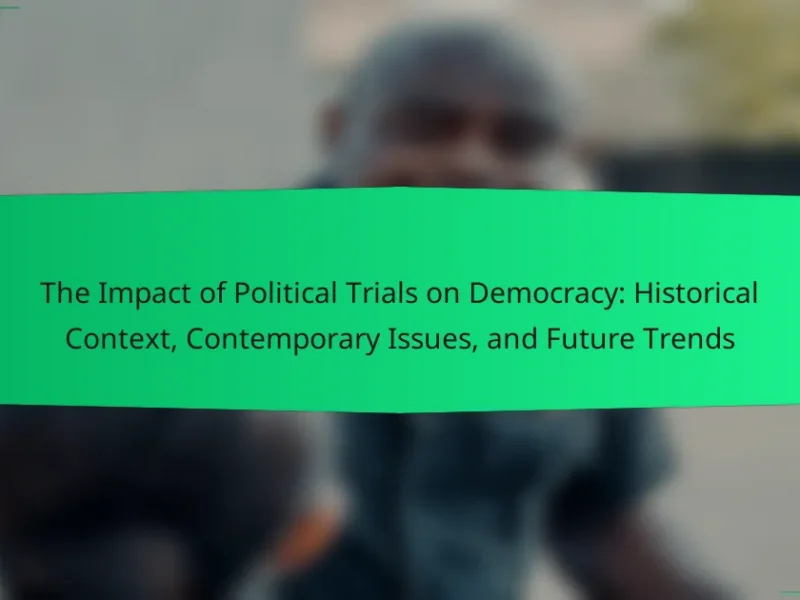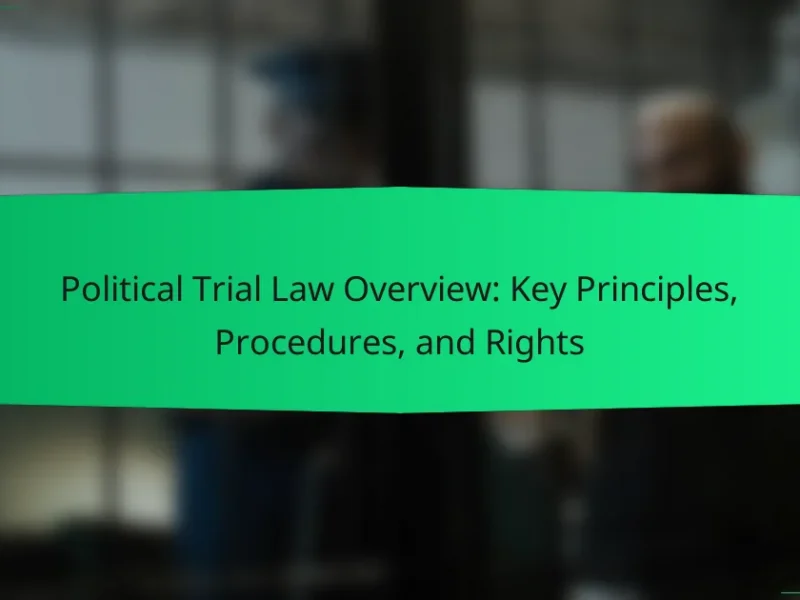Defenses in political trials refer to legal strategies employed by defendants to contest charges that are often perceived as politically motivated. These defenses may include arguments related to constitutional rights, free speech, and claims of necessity or self-defense. The article outlines common strategies used in these trials, such as public opinion manipulation, legal technicalities, and character defense, while also examining the legal frameworks that govern political trials, including constitutional, criminal, and international law. Historical case examples, such as the trials of Socrates, the Nuremberg Trials, and the impeachment trial of President Bill Clinton, illustrate the significant intersection of law and politics through various contexts.
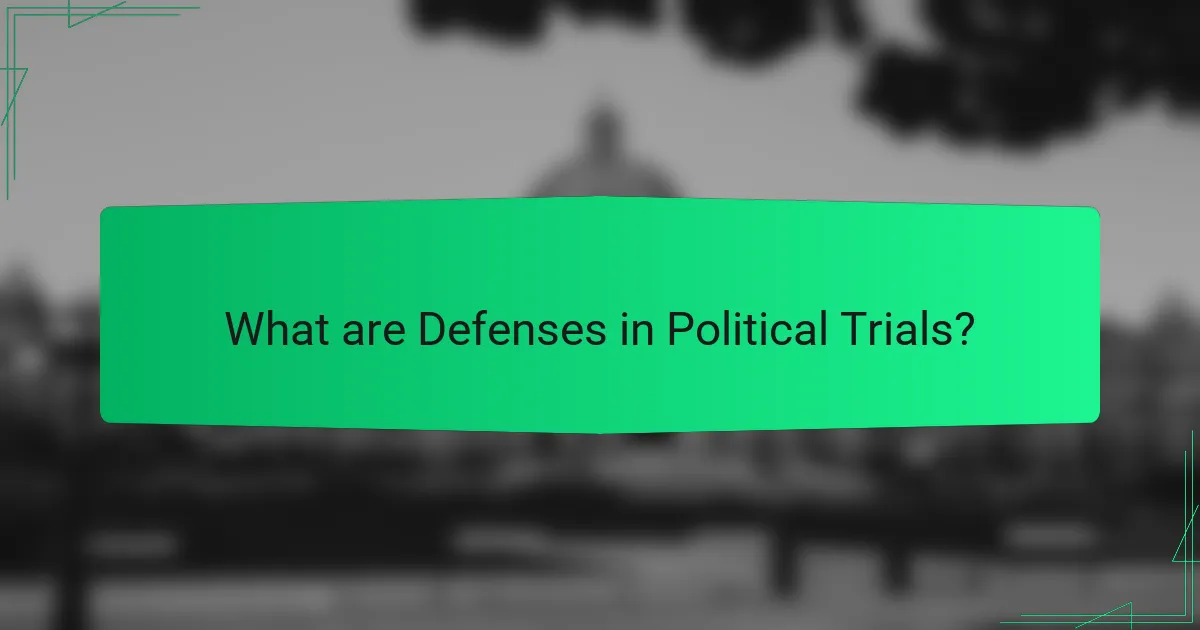
What are Defenses in Political Trials?
Defenses in political trials are legal strategies employed by defendants to challenge charges against them. These defenses often include arguments based on constitutional rights, political motivations, or the legitimacy of the actions taken. Common defenses involve claims of free speech, necessity, or self-defense. In many cases, defendants assert that the charges are politically motivated to suppress dissent. Historical examples include the defense strategies used in trials of political activists or whistleblowers. These strategies are crucial in highlighting the intersection of law and politics. They aim to protect individual rights in the face of state power.
How do Defenses in Political Trials differ from other legal defenses?
Defenses in political trials often differ from other legal defenses due to their focus on broader societal implications. Political trials frequently involve issues of state power, public interest, and civil rights. In these cases, defendants may argue motives related to political expression or dissent. This contrasts with standard legal defenses, which typically center on individual actions and intentions. For example, in political trials, defendants may invoke the necessity of their actions for social justice. This approach is less common in non-political legal contexts, where defenses usually rely on legal technicalities or factual innocence. Historical cases, such as the trial of Nelson Mandela, illustrate how political motivations shape defense strategies. These unique aspects highlight the intersection of law and politics in such trials.
What are the key characteristics of political trials?
Political trials are characterized by their focus on political issues rather than legal violations. They often involve defendants who are political figures or activists. These trials frequently lack impartiality, as they may be influenced by government agendas. The legal processes in political trials can be manipulated to serve political ends. Evidence presented may be selective or fabricated to support the prosecution’s case. Sentencing in political trials can be disproportionately harsh compared to standard legal cases. Furthermore, political trials may attract significant media attention and public scrutiny. Historical examples include the show trials of the Soviet Union, which exemplified these characteristics.
How do political motivations influence defense strategies?
Political motivations significantly shape defense strategies in political trials. These motivations often dictate the approach taken by legal teams. Defense strategies may emphasize political context to garner public sympathy. They can also highlight perceived injustices to challenge the legitimacy of the prosecution. Additionally, defense teams may leverage political affiliations to create narratives that resonate with jurors. Historical examples include the defense strategies employed during the trials of political figures like Nelson Mandela. His legal team framed the charges as politically motivated, which influenced public perception and support. Political motivations thus serve as a critical driver in crafting defense strategies that aim to sway both the court and public opinion.
Why are Defenses in Political Trials important?
Defenses in political trials are important because they protect the rights of the accused. They ensure a fair legal process, which is fundamental to justice. Defenses challenge the prosecution’s evidence and arguments. This scrutiny can reveal biases or weaknesses in the case. Historical examples show that effective defenses can lead to acquittals or reduced sentences. For instance, in the trial of former Illinois Governor Rod Blagojevich, defense arguments highlighted prosecutorial misconduct. Such defenses can also influence public perception and trust in the legal system. Ultimately, they uphold the principle of innocent until proven guilty.
What impact do these defenses have on justice and accountability?
Defenses in political trials can significantly affect justice and accountability. These defenses often challenge the legitimacy of the legal process. They may lead to acquittals or reduced sentences, undermining public trust in the judicial system. For example, the use of political motivations as a defense can obscure accountability for actions. This can create a perception of bias in the legal system. Additionally, defenses that invoke human rights can shift focus from the alleged crimes to the fairness of the trial. Consequently, these strategies can complicate the pursuit of justice. They may also set precedents that influence future cases and legal interpretations.
How do political trials shape public perception of the legal system?
Political trials significantly influence public perception of the legal system. They often highlight perceived biases and injustices within the judicial process. High-profile cases can polarize public opinion, leading to distrust in legal institutions. For instance, the trial of former President Donald Trump raised concerns about the fairness of legal proceedings. Such trials can also mobilize social movements, as seen in the cases of civil rights activists. The media plays a crucial role in shaping narratives around these trials, impacting how the public views the legal system. Ultimately, political trials can either reinforce or undermine faith in justice, depending on their outcomes and public discourse surrounding them.
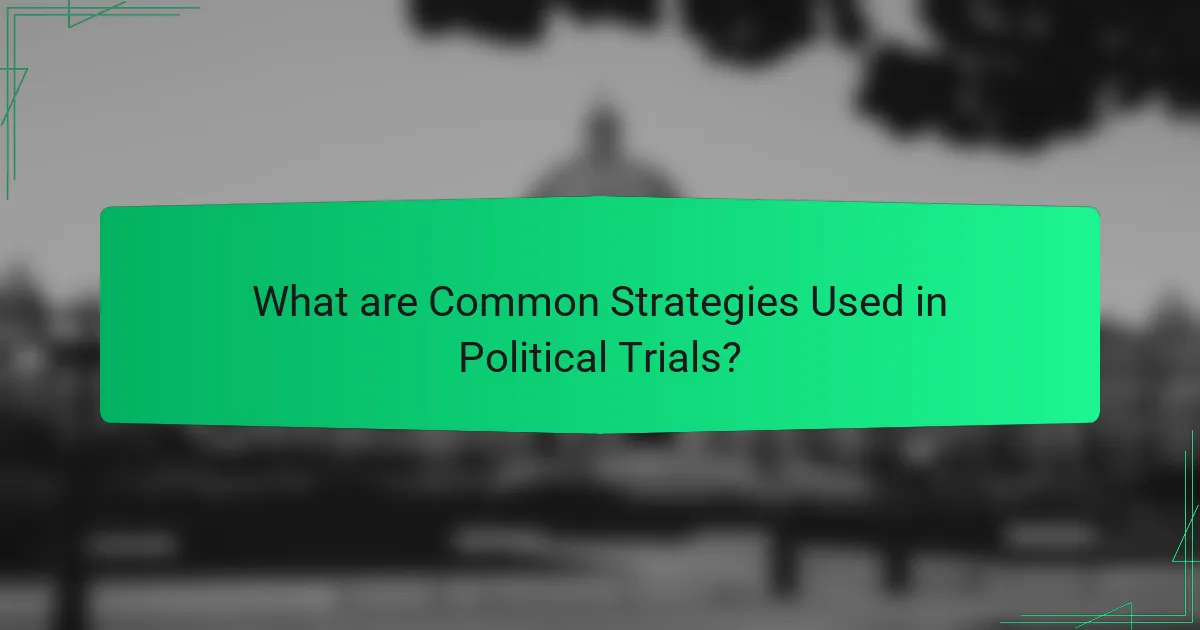
What are Common Strategies Used in Political Trials?
Common strategies used in political trials include public opinion manipulation, legal technicalities, and character defense. Public opinion manipulation involves shaping narratives through media to influence jurors and the public. Legal technicalities often focus on procedural errors to challenge the validity of evidence or the legality of the trial. Character defense emphasizes the accused’s integrity and past contributions to counter negative perceptions. These strategies have been observed in various historical political trials, such as the impeachment trials of political leaders where the defense aimed to sway public sentiment and exploit legal loopholes.
What are the most prevalent defense strategies in political trials?
The most prevalent defense strategies in political trials include the use of procedural defenses, character defenses, and necessity defenses. Procedural defenses challenge the legality of the trial process itself. For example, a defendant may argue that their rights were violated during arrest or interrogation. Character defenses focus on the personal attributes of the defendant. This strategy may involve presenting evidence of the defendant’s good character to sway the jury. Necessity defenses argue that the defendant’s actions were justified due to urgent circumstances. This can include situations where the defendant claims they acted to prevent greater harm. Historical examples show that these strategies have been effectively employed in high-profile cases, such as those involving political figures facing corruption charges.
How does the necessity defense apply to political trials?
The necessity defense applies to political trials by allowing defendants to argue that their illegal actions were justified due to an imminent threat. This defense asserts that the harm prevented by the action outweighs the harm caused by the action itself. In political contexts, this often involves civil disobedience or protest against perceived injustices. For instance, individuals may claim they broke laws to prevent greater harm, such as environmental destruction or human rights violations. Courts evaluate the necessity defense by considering factors like the immediacy of the threat and whether lawful alternatives were available. Historical cases demonstrate its use, such as the 1980s anti-nuclear protests where defendants argued their actions were necessary to prevent nuclear war.
What role does the public interest defense play in these cases?
The public interest defense serves to justify actions taken in the name of societal benefit. It allows defendants to argue that their actions, although potentially illegal, were intended to promote the greater good. This defense can mitigate legal consequences by framing the actions as necessary for public welfare. In various political trials, this strategy has been employed to challenge the legitimacy of charges. The effectiveness of the public interest defense often depends on the context and evidence presented. Courts may consider the broader implications of the defendant’s actions on society. Historical cases demonstrate its use in whistleblowing and activism. Ultimately, the public interest defense can influence the outcome of trials by shifting focus from legality to ethical considerations.
How do defendants utilize legal loopholes in political trials?
Defendants utilize legal loopholes in political trials to challenge the validity of charges against them. They often exploit ambiguities in laws or procedural rules. For instance, defendants may argue that certain evidence was obtained unlawfully. This can lead to the exclusion of key testimonies or documents. Additionally, they might invoke jurisdictional issues to claim the trial should not proceed in that specific court. Some defendants use technicalities in legal language to create doubt about the prosecution’s case. Historical examples include cases where defendants successfully argued for dismissal based on procedural missteps. These strategies highlight the importance of legal expertise in navigating complex political trials.
What are some examples of legal loopholes that have been successfully exploited?
Some examples of legal loopholes that have been successfully exploited include the use of offshore tax havens. Companies like Apple and Google have utilized these jurisdictions to minimize tax liabilities. Another example is the loophole in the U.S. bankruptcy law that allows individuals to discharge student loans under specific conditions. This has been exploited by some to avoid repayment. Additionally, the “carried interest” loophole allows hedge fund managers to pay lower tax rates on their earnings. This has been a point of contention in tax reform discussions. Another instance is the use of “stand your ground” laws, which have been interpreted in ways that allow individuals to avoid prosecution in self-defense cases. These examples illustrate how individuals and corporations can navigate legal frameworks to their advantage.
How do these loopholes affect trial outcomes?
Loopholes can significantly alter trial outcomes by creating opportunities for dismissal or acquittal. They may be exploited to challenge the admissibility of evidence, which can weaken the prosecution’s case. For example, if a procedural error occurs during evidence collection, it may lead to exclusion. This exclusion can prevent juries from hearing critical information. Furthermore, loopholes in legal definitions can result in misinterpretations of charges. A misinterpretation can lead to reduced sentences or complete exoneration. Historical cases illustrate this impact, where defendants leveraged loopholes to secure favorable outcomes. Thus, loopholes play a crucial role in shaping the trajectory of political trials.
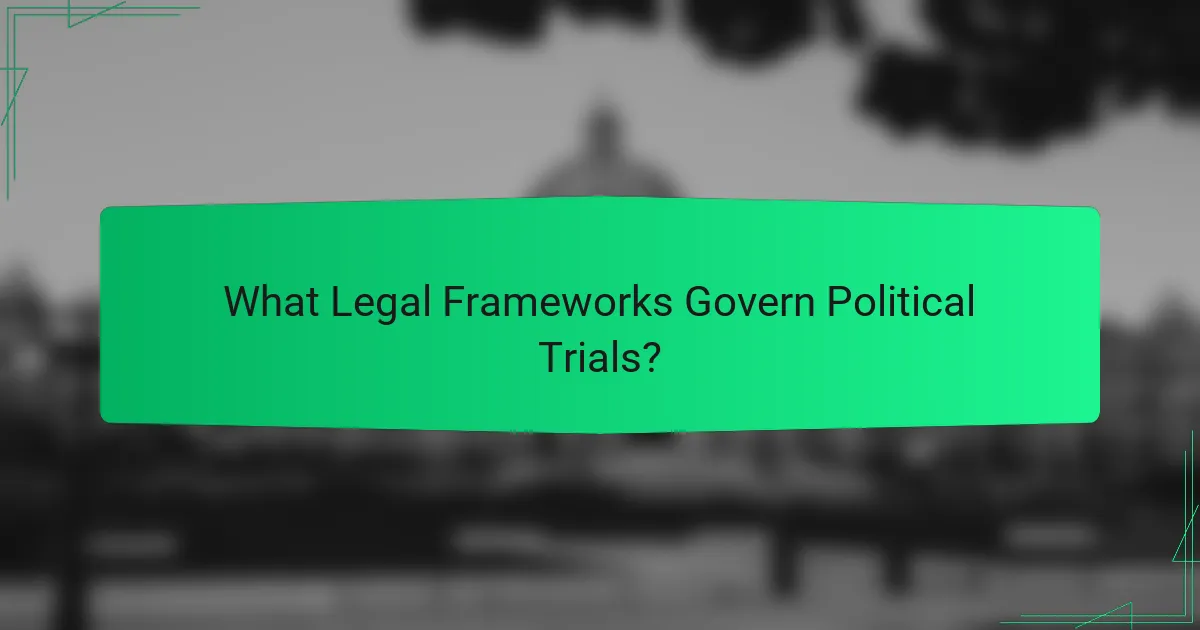
What Legal Frameworks Govern Political Trials?
Legal frameworks governing political trials vary by jurisdiction. They often include constitutional law, criminal law, and international law. Constitutional law provides the foundational principles for fair trials. Criminal law outlines specific offenses and procedures for prosecution. International law, including treaties and conventions, can influence domestic political trials. Examples include the International Covenant on Civil and Political Rights. This treaty emphasizes the right to a fair trial and due process. Additionally, national laws may define the scope and conduct of political trials. Historical cases, such as the Nuremberg Trials, illustrate the application of these frameworks. These legal structures aim to ensure justice and accountability in politically charged situations.
What laws and regulations specifically apply to political trials?
Political trials are governed by specific laws and regulations, which vary by jurisdiction. Commonly, constitutional law plays a significant role, ensuring due process and fair trial rights. Statutory laws may also apply, dictating procedures for criminal prosecution. International human rights laws, such as the International Covenant on Civil and Political Rights, influence political trials as well. These laws aim to protect individuals from arbitrary detention and ensure the right to a defense. Additionally, specific legal frameworks may exist within each country to address political offenses. These frameworks often include provisions for appeals and oversight mechanisms.
How do international laws influence domestic political trials?
International laws significantly influence domestic political trials by establishing standards for fair trial rights. These laws, such as the International Covenant on Civil and Political Rights, set guidelines for legal processes. They promote principles like due process, impartiality, and the right to legal representation. Many countries incorporate these international standards into their legal systems. This incorporation can affect the outcomes of political trials. For instance, domestic courts may reference international laws in their rulings. Additionally, international scrutiny can pressure governments to adhere to these laws. Violations may lead to international condemnation or sanctions. Thus, international laws shape the conduct and fairness of domestic political trials.
What constitutional protections are available to defendants in political trials?
Defendants in political trials have several constitutional protections. These include the right to a fair trial under the Sixth Amendment. This amendment guarantees an impartial jury and the right to confront witnesses. Additionally, the First Amendment protects free speech, which can be crucial in political contexts. The Fourth Amendment provides protection against unreasonable searches and seizures, ensuring privacy rights. The Fourteenth Amendment ensures due process, requiring fair legal proceedings. These protections are vital for maintaining justice and preventing government overreach in politically charged cases.
How do different jurisdictions approach political trials?
Different jurisdictions approach political trials with varying legal frameworks and procedures. In the United States, political trials often involve constitutional protections, such as the First Amendment. This ensures defendants can argue free speech as a defense. In contrast, countries like Russia may employ strict laws against dissent, limiting legal defenses. Political trials in authoritarian regimes often lack transparency and due process. For example, in Turkey, political trials frequently result in convictions based on vague charges. Each jurisdiction’s approach reflects its legal culture and political context, influencing the fairness and outcomes of such trials.
What are the variations in legal frameworks across countries?
Legal frameworks vary significantly across countries. Each nation has its own set of laws, regulations, and judicial systems. These differences can arise from historical, cultural, and social influences. For instance, common law systems, like those in the United States and the United Kingdom, rely heavily on precedents set by court decisions. In contrast, civil law systems, such as those in France and Germany, are based on codified statutes and comprehensive legal codes.
Additionally, some countries implement hybrid systems that incorporate elements from both common and civil law. Countries like Japan exhibit this blend, reflecting their unique legal evolution. Furthermore, variations can be seen in the enforcement of human rights laws. For example, European nations often adhere to the European Convention on Human Rights, while countries like China have different interpretations of rights and state authority.
The impact of these legal frameworks is evident in political trials. The rules governing evidence, defense strategies, and judicial impartiality can differ markedly. In some jurisdictions, political trials may be subject to more lenient standards of evidence, while others uphold strict legal protocols. Understanding these variations is crucial for analyzing political trials globally.
How do cultural differences impact the conduct of political trials?
Cultural differences significantly impact the conduct of political trials. These differences shape perceptions of justice and legal processes. For instance, in collectivist cultures, the emphasis may be on community values rather than individual rights. This can lead to a trial process that prioritizes societal harmony over personal defense. In contrast, individualistic cultures often focus on the rights of the accused. This can result in a more adversarial legal approach.
Moreover, cultural norms influence courtroom behavior and expectations. In some cultures, deference to authority may affect how witnesses and defendants present themselves. This can impact the effectiveness of testimony and legal arguments. Additionally, cultural narratives surrounding political power can shape public opinion about trials. For example, trials seen as politically motivated may be viewed differently in various cultural contexts.
Historical examples illustrate these impacts. The Nuremberg Trials faced criticism for their Western-centric approach to justice. Similarly, political trials in countries like China reflect Confucian values that prioritize social order. These cases highlight how cultural frameworks can alter the dynamics and outcomes of political trials.
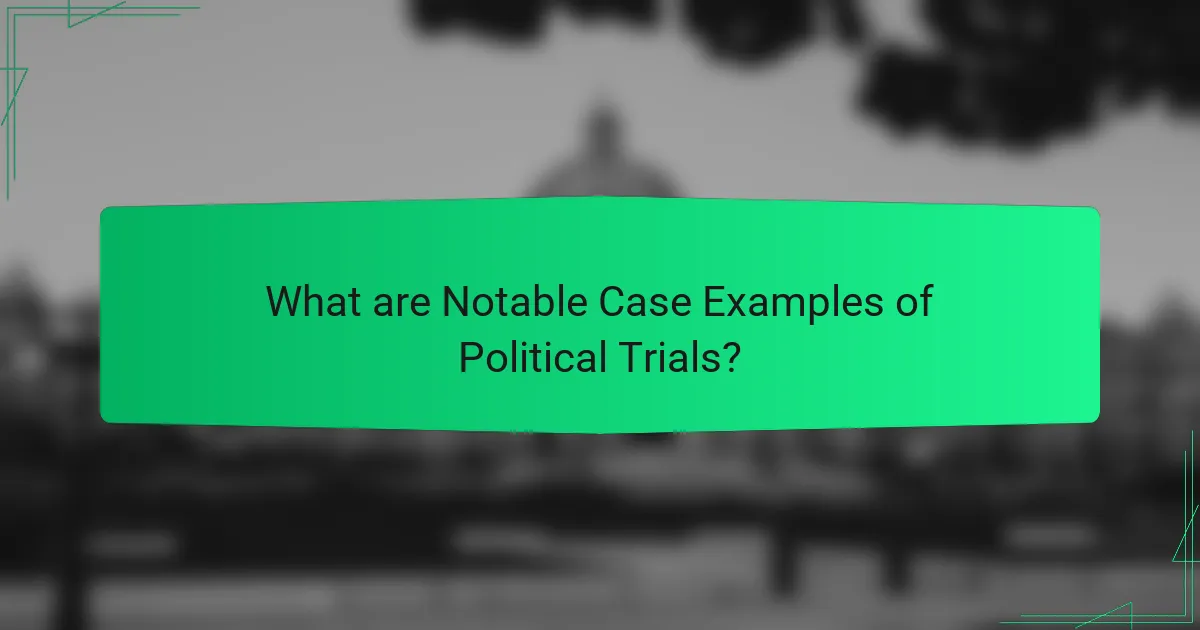
What are Notable Case Examples of Political Trials?
Notable case examples of political trials include the trial of Socrates in 399 BC. Socrates was charged with corrupting the youth of Athens and impiety. His trial is significant in philosophical and political discourse. Another example is the Nuremberg Trials after World War II. These trials prosecuted key Nazi leaders for war crimes and crimes against humanity. The trials established important precedents for international law. A more recent example is the impeachment trial of President Bill Clinton in 1999. Clinton faced charges of perjury and obstruction of justice related to the Monica Lewinsky scandal. These trials highlight the intersection of law and politics across different historical contexts.
What are some landmark political trials in history?
Landmark political trials in history include the trial of Socrates, the Nuremberg Trials, and the trial of Nelson Mandela. The trial of Socrates in 399 BC addressed charges of impiety and corrupting the youth of Athens. It is significant for its philosophical implications and the defense of free speech. The Nuremberg Trials took place after World War II. They held Nazi leaders accountable for war crimes and established precedents for international law. The trial of Nelson Mandela occurred in 1964. Mandela was charged with sabotage against the apartheid government in South Africa. His trial drew global attention to the anti-apartheid movement and highlighted issues of justice and human rights. Each of these trials played a crucial role in shaping political discourse and legal frameworks in their respective contexts.
How did these trials influence legal precedents?
These trials significantly influenced legal precedents by establishing new interpretations of constitutional rights. They often challenged the limits of free speech and due process. For instance, landmark cases set standards for the protection of dissenting opinions. The outcomes led to stronger legal protections against unlawful detentions. Additionally, they prompted courts to scrutinize the government’s authority in political matters. Historical examples include the trial of the Chicago Seven, which shaped public discourse on civil liberties. These precedents continue to guide judicial decisions in contemporary political cases. Overall, the trials redefined the legal landscape regarding political dissent and government accountability.
What defense strategies were employed in these landmark cases?
Landmark cases employed various defense strategies including the necessity defense, self-defense, and public interest defense. The necessity defense argues that illegal actions were taken to prevent greater harm. In the case of United States v. Schoon, the defendants claimed their actions were necessary to prevent environmental destruction. Self-defense was used in cases like the Black Panther Party trials, where defendants argued they acted to protect themselves from imminent threats. The public interest defense, as seen in the Pentagon Papers case, asserted that the publication served the public good by revealing government misconduct. These strategies were pivotal in shaping legal precedents and influencing public perception of political dissent.
What lessons can be learned from recent political trials?
Recent political trials reveal important lessons about accountability and the rule of law. They highlight the significance of transparency in judicial processes. These trials often expose the complexities of legal defenses used by political figures. They demonstrate how public opinion can influence legal outcomes. Additionally, they show the potential for political motivations behind prosecutions. The outcomes of these trials can reshape public trust in institutions. For instance, the trial of former President Donald Trump in 2023 illustrated the contentious intersection of politics and law. Such cases underscore the necessity for impartial legal frameworks to ensure fair trials.
How do contemporary political trials reflect current societal issues?
Contemporary political trials reflect current societal issues by highlighting divisions in public opinion and governance. These trials often emerge during times of political unrest or controversy. They serve as a barometer for societal values and norms. For instance, trials involving political figures can reveal underlying tensions regarding accountability and justice. The media coverage of these trials shapes public perception and discourse. High-profile cases, such as those involving allegations of corruption or abuse of power, illustrate societal demands for transparency. Additionally, the outcomes of these trials can influence public trust in institutions. Overall, political trials act as a mirror to the prevailing societal climate and its challenges.
What can future defendants learn from these case examples?
Future defendants can learn the importance of understanding legal frameworks from these case examples. They highlight how different defenses can be strategically employed. Analyzing previous outcomes informs expectations for similar cases. Successful defendants often utilized specific legal arguments effectively. Understanding the context of political trials can shape defense strategies. Additionally, these cases illustrate the need for thorough preparation and evidence gathering. They demonstrate the value of expert testimony in strengthening a defense. Future defendants should also recognize the role of public perception in political trials.
What best practices should be considered in political trials?
Best practices in political trials include ensuring impartiality, maintaining transparency, and upholding the rule of law. Impartiality is crucial for fair proceedings. Judges and juries should be free from bias. Transparency builds public trust in the judicial process. Open court sessions and accessible documentation support this principle. Upholding the rule of law protects individual rights. Legal representation must be guaranteed for all defendants. Adequate preparation time for defense teams is essential. Observing international legal standards enhances credibility. These practices promote justice and fairness in politically charged cases.
Defenses in political trials are legal strategies utilized by defendants to contest charges, often focusing on constitutional rights, political motivations, and the legitimacy of their actions. Key characteristics of these trials include their emphasis on societal implications, the influence of state power, and the potential for biased legal processes. Common defense strategies encompass procedural defenses, character defenses, and necessity defenses, which aim to challenge the prosecution’s case and highlight broader issues of justice and accountability. The article also explores notable historical cases, the impact of legal frameworks, and the role of cultural differences in shaping trial outcomes, providing insights into how political motivations affect defense strategies and public perception of the legal system.
